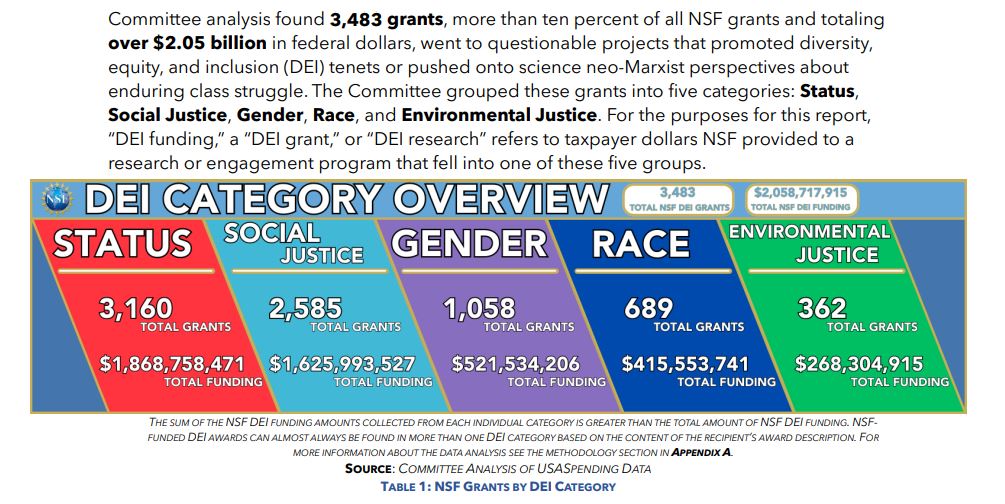
The federal government has spent over $2 billion dollars over the last three years infusing and embedding diversity, equity and inclusion concepts into scientific research – tainting the efforts with ideology and diminishing discoveries — according to the recently published findings of a report commissioned by a Senate subcommittee.
The National Science Foundation has awarded taxpayer dollars “to projects that divide Americans and support investigations or publications that are of questionable scientific value,” the 43-page report states.
A leading critic of the encroachment of DEI into STEM, Anna Krylov, said the findings illustrate a misuse of public funds by the NSF.
“[I]nstead of funding science, they dump money into pseudoscience, miseducation, and ideological indoctrination,” she said in an email to The Fix.
Published in October by the U.S. Senate Committee on Commerce, Science, and Transportation, the Senate report traces the problem to the “beginning of the Biden-Harris administration.”
The National Science Foundation under this leadership, the report states, “increasingly funded research and programs that color scientific investigation and engagement projects through the lens of political ideology, undermining objective hard science disciplines…in which facts and theories can be precisely measured, tested, and independently reproduced.”
From January 2021 through April 2024, the NSF awarded 3,483 grants amounting to more than $2.05 billion to “questionable projects that promoted diversity, equity, and inclusion (DEI) tenets or pushed onto science neo-Marxist perspectives about enduring class struggle,” the report states.

Shefford Baker, associate professor of materials science and engineering at Cornell University, told The College Fix in a phone interview that this is part of a longer series of policies that placed requirements unrelated to scientific merit on researchers seeking federal funds for their work.
Some of these, Baker said, were reasonable, such as pushing scientists to engage in public outreach or promote science among K-12 students. However, he noted, later requirements could entail trying to get “people from certain identity categories to go into science.”
When this failed to produce desired outcomes, Baker said, the NSF decided they needed to research “how do you get all these underrepresented groups to be represented in every field of science at every level of academia and at the same proportions [present] in the general population.”
Among projects detailed in the report are a $349,985 University of Colorado endeavor to “identify learning experiences that enable engineering for social justice” and a $2 million joint effort by researchers at UC Berkeley and the University of South Florida to combat anti-black racism in engineering curricula.
It also flagged a $1,505,031 project at Florida State University to build a “Sisterhood in Computing” by leveraging black feminist epistemologies and “[black women’s] ways of knowing.”
Also on the list: an ongoing attempt by San Jose State University scientists to develop “a hub for justice-centered science education” that aims to produce “school-based materials and professional development activities that examine the interwoven nature of climate justice and racial justice” that will cost $786,285 by 2027.
Baker described many of the projects cited in the report as “unserious” and “observational reporting [that] isn’t really science.”
DEI projects initially accounted for 0.29 percent of funds dispersed by the NSF in 2021 — but by 2024 they were receiving more than 27 percent of NSF grant funding, according to the report. Although other recent Democrat administrations similarly attempted to imbue science with left-wing ideology, the bulk of these efforts and the drastic increase in the funding they received can be traced to a pair of efforts initiated during the Biden-Harris administration, it states.
For one, a January 2021 memorandum created a “Task Force on Scientific Integrity” charged with assessing the effectiveness of numerous scientific integrity policies, as well as reviewing “the impact on scientific integrity of diversity, equity, and inclusion practices related to the Federal scientific and engineering workforce and scientific Federal advisory committees.”
Then came a January 2022 report from the task force that claimed efforts to thwart DEI initiatives are inherently disruptive to the scientific process and recommended DEI considerations be incorporated “into all aspects of science planning, execution, and communication.”
Consequently, the October 2024 Senate report notes, the National Science Foundation followed the Task Force on Scientific Integrity’s recommendations by integrating DEI considerations into funding decisions.
“And this is only the tip of the iceberg!” wrote Krylov in her email to The Fix. “In addition to these grants that are clearly dedicated to advancing the Critical Social Justice agenda (which commonly operates under the name of DEI), the ideological, non-scientific criteria are also applied to funding of technical projects…This is done either through the mandatory DEI statements or through the ‘Broader Impact’ criteria, or both.”
Krylov noted that she and several co-authors have documented these trends in a paper published earlier this year.
Additionally, many NSF grant recipients, the Senate report notes, have engaged in left-wing activism not only in their personal lives and on their campuses but also in their classrooms and their labs.
Several researchers highlighted in the report have been vocal supporters of pro-Palestinian campus protests. One in particular, Tammie Visintainer, a San Jose State University professor working on the “justice-centered science education” hub, even used her “science methods course for aspiring middle and high school science teachers,” which she describes as “center[ing] racial justice in science education,” as a platform for discussing the Israeli-Palestinian conflict and “process[ing] the impact” of the harsh language used by Israeli political leaders when speaking of Palestinian terrorists.
Many others, the report notes, hold beliefs that science and STEM are inherently oppressive or discriminatory against women, racial minorities, and other allegedly marginalized groups.
The report also suggests these beliefs serve as the foundation of many NSF-funded projects carried out by these researchers, demonstrating that “the Biden-Harris administration, through [the] NSF, is deliberately and systematically inserting a divisive political ideology into ‘scientific research.’”
“Instead of identifying the best or most talented scientists,” it states, the NSF “funded researchers who prioritized filling out research teams and programs based on ethnicity, cultural background, or political perspectives.”
The College Fix reached out to the office of Senator Ted Cruz, the ranking member of the U.S. Senate Committee on Commerce, Science, and Transportation, for comment, asking whether he sees the practices described in the report changing given the results of the 2024 elections. His office has yet to reply.
Responding to the same question, Krylov wrote, “We can expect that the new government will roll back the most egregious DEI policies, such as DEI-mandating executive orders, which is a welcome development.”
“However,” she noted, “this alone is not sufficient — more significant changes are needed to root out DEI from the funding agencies and other institutions, to reduce bureaucratization of science, and to restore focus on merit. For this, the scientific community must mobilize and act.”
Expressing similarly mixed feelings, Baker told The Fix: “I think things are going to be different because there’ll be changes that will be perceived by many people as chaotic.”
Yet, he added, “It took us generations to get into this mess. I don’t think it will be easy to get back out.”
“What I’m hoping will happen,” he said, “is we will re-learn how to have conversations among people who don’t necessarily agree.”
MORE: Idaho education board debates cutting DEI offices at universities
Like The College Fix on Facebook / Follow us on Twitter






Please join the conversation about our stories on Facebook, Twitter, Instagram, Reddit, MeWe, Rumble, Gab, Minds and Gettr.